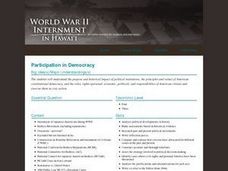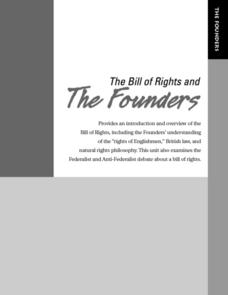National Endowment for the Humanities
George Washington: The Precedent President
Everyone knows that George Washington was the first president, but do your scholars know why that was so important? The lesson plan, the third in a sequence of three, allows learners to understand how George Washington set a precedent...
Constitutional Rights Foundation
Guest-Worker Program
The U.S. Guest-Worker Program and the H-2A visa are the focus of a social studies activity. First, class members assume the role of advisors who must present the president with four proposals that would amend the visas given to...
Curated OER
Breaking Barriers
Young scholars investigate racism in the 20th century by exploring U.S. History. In this Civil Rights lesson, students review the history of slavery, the Civil War and the fight for equality in the mid 1900's. Young scholars complete...
Curated OER
Creating A Bill Of Rights In Space
Young scholars define rights, analyze and apply the U.S. Bill of Rights to hypothetical situations, and create an Intergalactic Bill of Rights.
Curated OER
Constitution and the Bill of Rights
Fourth graders explore the information of the index of the Constitution. For this Constitution and Bill of Rights lesson, 4th graders complete a worksheet by locating keywords in the index. Students understand the importance of using an...
Curated OER
Whose God?
Students investigate religious freedom in the U.S. They watch and discuss a Bill Moyers NOW video, take a Freedom of Religion quiz, write an essay, and participate in a mock trial and debate.
Curated OER
Reviewing the Election Process by NOW Classroom for PBS
Students take a closer look at presidential elections. In this election process instructional activity, students discuss the roles of the primary, caucus, polls, Electoral College, delegates, and lobbyists in the process. Students then...
Curated OER
A Salute to American Symbols
Students research American symbols. In this American History lesson, students listen to the story The Wall and discuss the Vietnam Veterans Memorial. They also listen to One Nation and research an American Symbol to create a...
Curated OER
Black Kentuckians and the Civil War
Students demonstrate how the American Civil War affected black Kentuckians socially and politically. They identify and discuss the 13th Amendment to the U.S. Constitution, which forced the end of slavery in Kentucky months after the...
Curated OER
Participating in Democracy
Students analyze film clips in class. In this democracy lesson plan, students identify the differences between civil liberties, democracy and freedom. Students view a video regarding Japanese internment and answer study questions as well...
Curated OER
History Biographies
Students explore the life and the contributions of five people from U.S. history in the five lessons of this unit. james Madison, Dolly Madison, Sequoyah, Harriet Tubman, and Clara Barton are presented to students for exploration and...
Curated OER
Voting and the U.S. Constitution (Past, Present, and Future), Part 2
Students analyze and discuss the 19th Amendment, and read the document, Why Women Want to Vote. Students illustrate statements from the handbill, then conduct a play about women's suffrage.
Curated OER
A Lesson To Accompany "The First Bank of the United States: A Chapter in the History of Central Banking"
Here is an interesting topic. Learners examine the economics that led to the founding of the First Bank of America. They participate in a reader's theater experience depicting the debate between Alexander Hamilton and Thomas Jefferson...
Center for Civic Education
To Amend or Not to Amend, That's Been the Question...Many Times
Looking for some ideas for how to celebrate September 17, Constitution Day? Check out a packet that focuses on the factors that are considered in the amendment process. Class members examine the amendment process and the types of...
Administrative Office of the US Courts
Nomination Process
"I do solemnly swear that I will support and defend the Constitution of the United States..." Scholars investigate the nomination process of Supreme Court justices when assuming office. Through examination of primary and secondary...
C-SPAN
Choice Board: Expressed and Implied Powers
Article 1, Section 8 of the United States Constitution expressly lists powers given to Congress. Over the years, lawmakers have expanded the enumerated powers to include powers implied by the list. To better understand the significance...
City University of New York
Electoral College
A presidential election is a lot like the 2004 World Series, and it's also a lot like choosing an orange in a paper bag. Apply the process of the electoral college to these two analogies with a set of lessons about government...
Curated OER
A Nation's Voice
Students research the Constitution and the War Powers Act in order to determine what the powers of the government are in times of conflict. They answer a series of questions then write a legal brief either supporting or condemning the...
Museum of Tolerance
The Role of Citizens in a Participatory Democracy
Groups research participatory democracies and compare the role and rights of citizens in ancient history with those in recent U.S. history. Guided by a series of questions, individuals compose a persuasive essay in which they discuss the...
C-SPAN
Electoral College Pros/Cons and Alternatives
If every vote counts, why do we need the electoral college? Middle and high schoolers study the Constitutional precedent of the electoral college, as well as its place in historical and modern elections, with an engaging social studies...
State Bar of Texas
Marbury v. Madison
Who has the final say in matters dealing with the rules under the United States Constitution? The case Marbury v. Madison brings to light the issue of judicial review. Learners investigate the Supreme Court's opinion in the case with a...
Curated OER
The Bill of Rights and the Founders
Students explain similarities between historical statements of rights and their modern applications, explore ideas of "Rights of Englishmen" and natural rights, discuss evolution of concept of rights and its impact on Bill of Rights,...
Curated OER
What Are Our Common Values?
Students make a poster. In this values lesson, students read the Preamble to the Constitution and discuss the core democratic values that are found there and in the Declaration of Independence. Students are each assigned a core...
Curated OER
Civil Liberties and 9/11
Fifth graders examine the effects of 9/11 on two guarantees in the Preamble of the Constitution, the preservation of liberty and the establishment of common security. They examine how our personal liberties been affected by the 9/11...

























